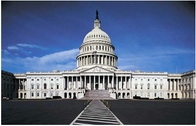Advertisement
NAR testifies to Congress on commercial real estate crisis

The commercial real estate market is experiencing its worst liquidity challenge in almost 20 years, and it is vital that Congress take action to prevent a deepening crisis, the National Association of Realtors (NAR) said in its Monday, May 17th testimony to the U.S. House of Representatives Subcommittee on Oversight and Investigations.
During a field hearing, G. Joseph Cosenza, an owner of Inland Real Estate Group in Oak Brook, Ill., testified on behalf of NAR and the Illinois Association of Realtors (IAR). Cosenza said the crisis is driven by a confluence of high unemployment, a slow economy, weakening commercial property fundamentals, and an increase in commercial loan delinquencies.
"Commercial real estate is the basis for much of the growth in the American industry and economy, and having a stable and well-functioning commercial market is crucial to our nation's economic recovery," Cosenza said. "But the market is now in the midst of a financial meltdown and many property owners are underwater. We cannot regain our footing until action is taken on such issues as an enhancement of liquidity and extensions of terms for performing properties."
Cosenza outlined a number of proposals he urged the congressional panel to consider.
First, NAR supports changes that will boost lending to the commercial real estate and small business markets, he said. Currently, due to the slumping economy and falling commercial real estate values, many commercial banks have tightened their credit standards and reduced their loan volumes. Credit unions have often filled this need in the past, but they are hampered by a business lending cap of 12.25 percent of total assets. NAR strongly supports HR 3380, "Promoting Lending to America's Small Businesses Act," which would increase the cap on credit union lending to 25 percent of total assets.
Cosenza also pointed out that commercial loans are often short term, and property owners must refinance frequently. "More than half of the outstanding business loans held by credit unions have been extended by those approaching, or at, the cap. That means that credit unions with experience in handling commercial loans are unable to continue helping us get out of this crisis," Cosenza said.
In addition, lenders should be encouraged to extend the term of current loans, he said, but they have been wary of offering extensions because of oversight and regulatory concerns.
He said incentives and improved cash flow for investors of commercial property would help fend off some of the challenges the market faces and soften some of the commercial liquidity crisis. "The most effective means of improving the cash flow on real property is to provide more generous depreciation allowances. NAR believes that some combination of accelerated depreciation (or shorter recovery periods) and passive loss relief would be significant investor incentives," Cosenza stated.
NAR also supports developing a mortgage insurance program for commercial debt and an extension of the Term Asset-Backed Securities Loan Facility (TALF) program. A proposed mortgage insurance program would provide insurance on the difference between the current value of a commercial property and the debt service. NAR believes an extension of TALF will help stimulate the commercial mortgage-backed securities market and that the program requirements should be less burdensome for investors.
"The commercial real estate sector supports more than nine million jobs and generates billions of dollars in federal, state and local tax revenue," said Cosenza. "NAR believes the commercial market is vital to American life and urges Congress to act quickly on these crucial issues."
For more information, visit www.realtor.org.
About the author





